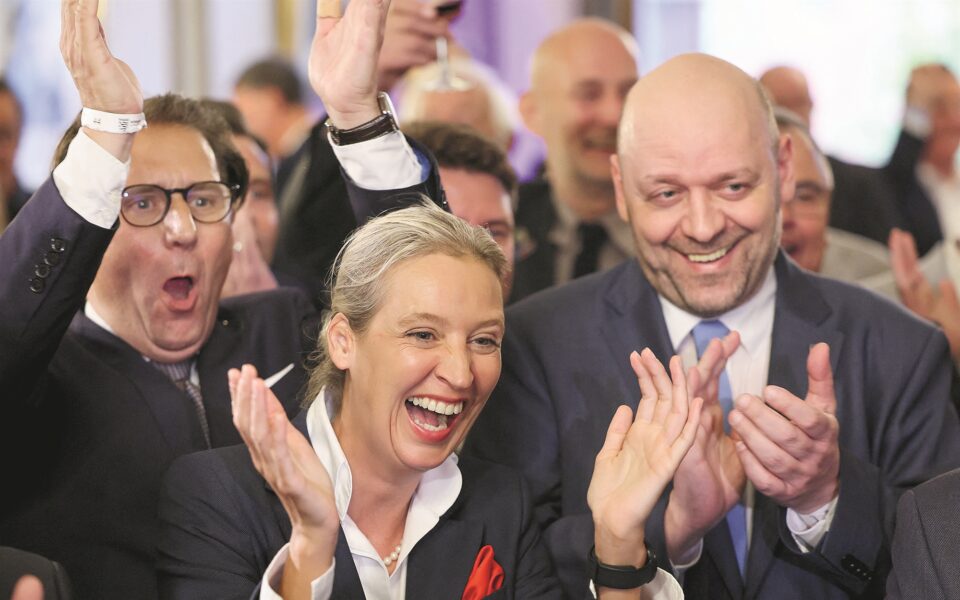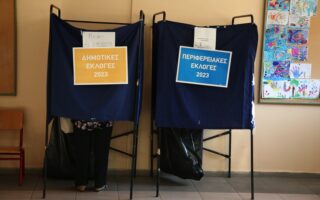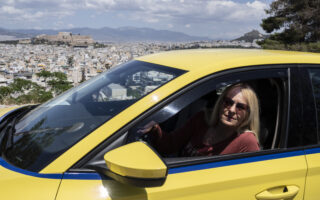The Greek who shook up Hesse
Robert Lambrou, a candidate with xenophobic AfD who secured 18.4% in Hesse state elections, talks to Kathimerini

Robert Lambrou, the candidate of the xenophobic Alternative for Germany (AfD) in the elections for the parliament of the State of Hesse, is full of contradictions. Although he is the son of a Greek man from the town of Thiva, he is an official of a party which was founded with the sole aim of throwing Greece out of the euro. Although he has an immigrant background, he is in favor of a tough immigration policy. Among his central goals is to reform the European Union, at a time when his party wants its dissolution. It is also worth noting that in his youth he was a member of the Social Democratic Party of Germany (SPD), while now he represents a clearly far-right party.
When I list all these details of his resume to him, he laughs and admits that, at first glance, they do sound contradictory. But he is quick to correct me: “The AfD was not formed to expel Greece from the eurozone, but to prove that there is an ‘alternative’ policy to that of [former chancellor] Angela Merkel on the issue of bailouts. That is why it was called ‘alternative,’ while the former chancellor insisted that there was no other alternative to the policy she followed.” “Yes, but wasn’t he in favor of Greece abandoning the common currency?” I ask. “Yes, because I thought it would be better for the country,” he responds.
Ten years after its creation, AfD is no longer an exclusively east German phenomenon, since the recent elections held in early October in Hesse and Bavaria confirmed its ideological dominance, managing to define the agenda of public discourse with his hard-right positions. The AfD took 14.67% of the vote in Bavaria and 18.4% in Hesse, and in the latter, its influence increased by more than 5% (in Bavaria just over 4%). Political analysts believe that the party’s good performance in the former West Germany is largely due to young voters, who are worried about inflation, the energy crisis and immigration, and are fascinated by its use of TikTok in its campaigns. Despite its appeal, the political system insists on its exclusion from any kind of cooperation.
Lambrou is optimistic that this will change. “When do you think you will come to power?” I ask him, but the phrase I use in German – “An die Macht kommen” – tells me it creates negative (neo-Nazi) connotations. “OK, when are you going to govern?” I rephrase the question. “I believe that within the next one to two years we will have established partnerships at the state level,” he says. “For the last six to eight months, the party has been hovering around 20% in the polls. This means over 12 million voters. How much longer will it be realistic to isolate 12 million citizens in a democracy? Now the majority of Germans are demanding a limit to mass immigration and this demand is being completely ignored.”
His parents – a Greek father and German mother – met as students in Munster, North Rhine-Westphalia, where he was also born. He studied business administration and at some point decided to choose German citizenship, renouncing his Greek citizenship. “Why?” I ask him. His view is that dual citizenship creates confusion and that one has to choose where one belongs. He recently founded an association for Germany made up of citizens with immigrant roots.
‘For the last six to eight months, the party has been hovering around 20% in the polls. This means over 12 million voters’
“As a party we categorically reject illegal immigration. It is a state failure that millions of immigrants are still allowed to come into the country from 2015 to today. This kind of immigration policy dramatically exacerbates existing problems. The association I have founded is for people with an immigrant background for Germany, as it is called. It is interesting that when students come and ask us about our relationship with immigrants, they expect to hear very negative opinions from us. But this is a consequence of the stigmatization and defamation of the AfD,” Lambrou says.
“We want people to come to Germany legally, to integrate, which means to adopt our dominant culture (Leitkultur), our values – for example the equality of the two sexes, the separation of state and church and to respect the constitution and not sharia. Under these conditions we can welcome them with all our hearts. That is why many foreigners vote AfD. There is a widespread myth that those with immigrant roots are automatically leftists. This is not true. Many of them are looking for a conservative political shelter.”
The ‘faction’
Lambrou also finds the view expressed by Christian Democrat leader Friedrich Merz that asylum seekers come to Germany and get their teeth fixed for free while Germans wait in line “extremely divisive.”
“You won’t find a similarly extreme statement from me no matter how hard you look,” he proclaims. “Of course, to a certain extent he is right that a large part of this mass immigration wave is coming to claim medical care without having paid the slightest contribution and is very well aware of their rights. That is not xenophobic!” he says.
I remind him that there is a section in his party, the so-called Wing (Der Flugel), which has overtly racist, Islamophobic, revisionist views and relativizes the crimes of National Socialism. Although the Federal Office for the Protection of the Constitution has placed this radicalized faction under surveillance, its leader and party head in Thuringia, Bjorn Hecke, remains a party official.
“Indeed, a section of the party has to undergo a process of maturation, which has already begun with the dissolution of the Wing, a very interesting process is already under way, and these people have evolved significantly in a very positive direction,” he argues. “Yes, but the same people are still members of the AfD,” I interrupt. “What is your relationship with Hecke?” I ask Lambrou. “I meet him at the leadership group meetings at the federal level. I have no direct relationship with him. I know my other colleagues much better and on a much more personal level.”
I ask him if he has read reports in the Greek press that concern him. “My brother, who knows Greek well, reads them,” he says. His father still lives in a village outside Thiva. Lambrou often visits in the summers. This year, due to the election campaign, he stayed in Germany and gave an interview to RTL, where, commenting on the fires on Rhodes and Evros, he claimed that every year we have big fires in Greece. “So you’re a climate change denier?” I ask. “You took one of my statements and took it out of context. I said that the fact that there are fires is not in itself proof of climate change because in the last decades Greece always burns during the summer. Climate change exists, but what we don’t know is what the human contribution is,” he responds.
“Our party believes that human activity does not play such a big role and therefore it is no worth the trouble investing money to fight climate change.”





